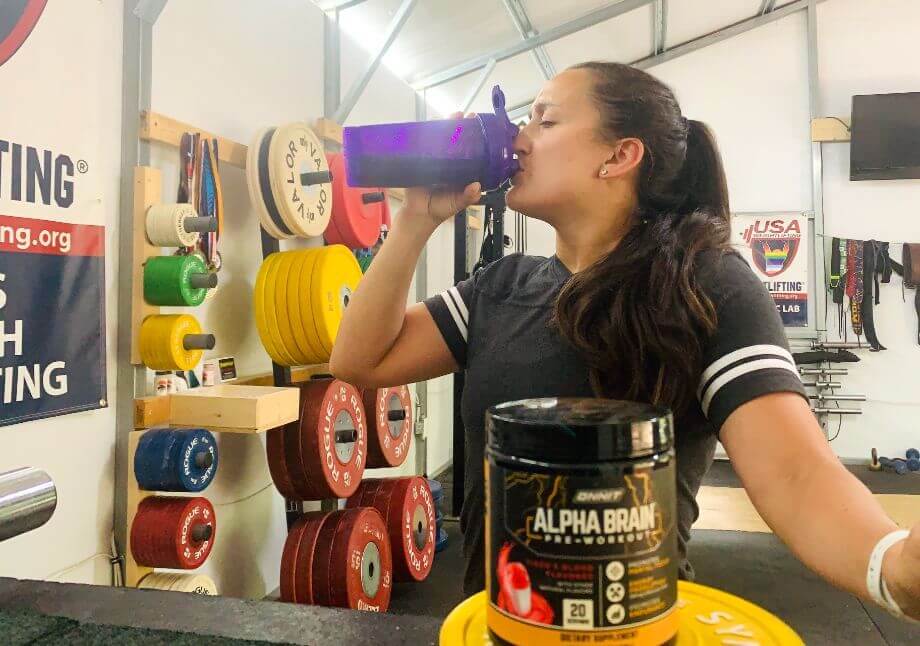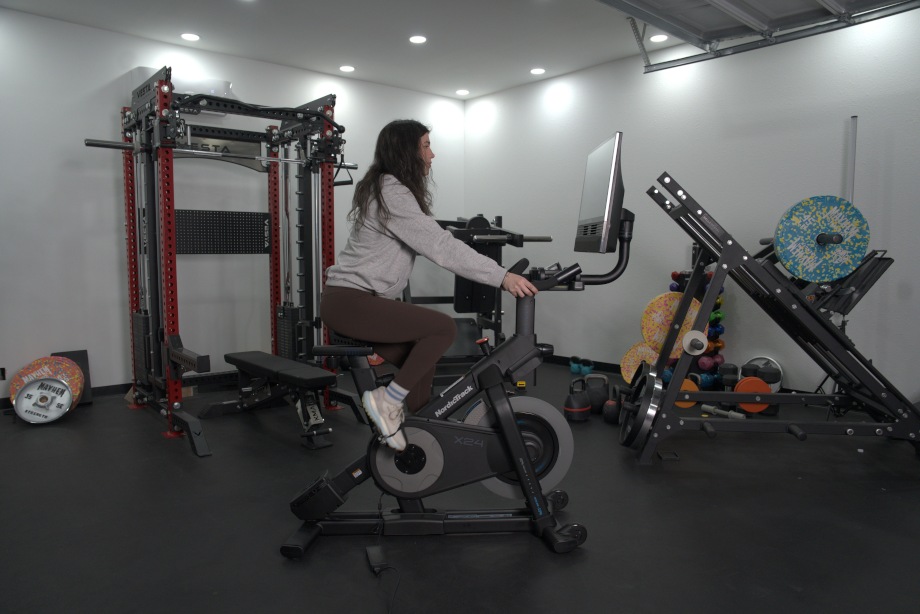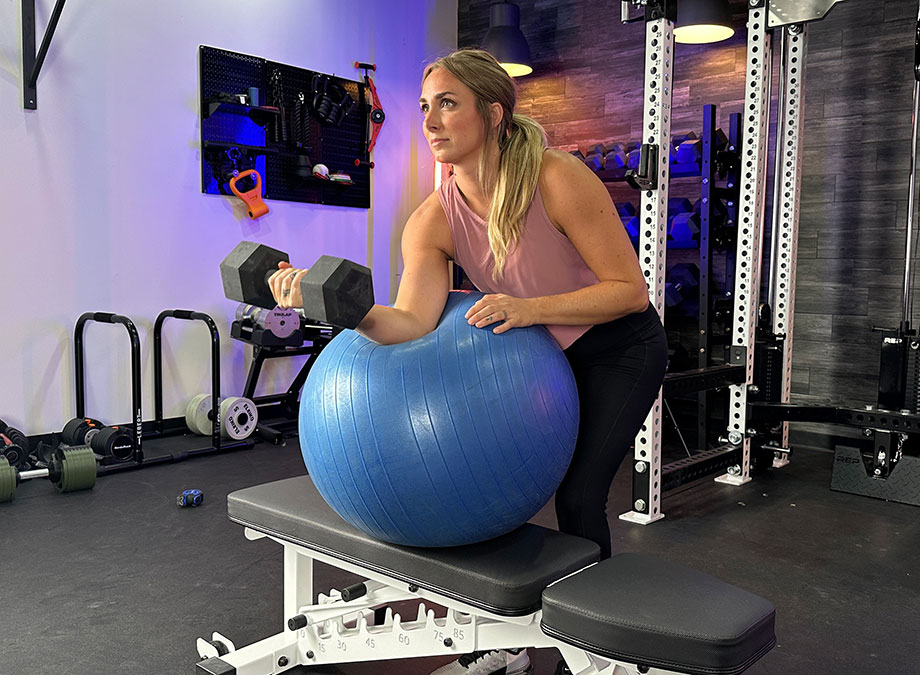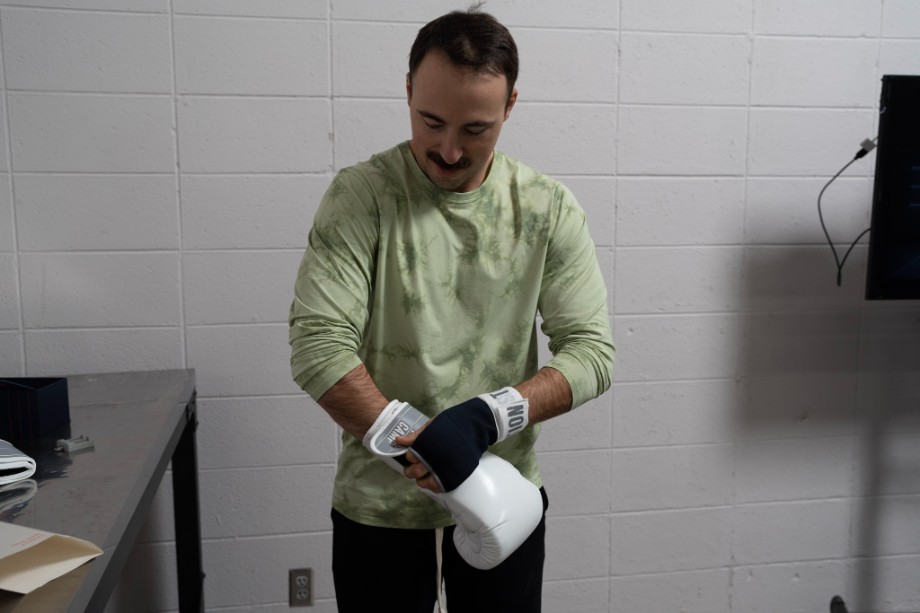Whether you’re an athlete in the thick of training or a fitness enthusiast who wants to improve your exercise performance, you might be considering the best pre-workout. Pre-workout supplements have gained popularity for enhancing physical performance, increasing energy levels, and maximizing training sessions. But does pre-workout have calories? Extra calories could be a deal breaker if you want to lose weight or burn fat.
RELATED: What to Look for in a Pre-Workout
Not to worry, I’ve got the breakdown. There are many types of pre-workouts, and while not all contain calories, most do. However, the average pre-workout supplement contains amino acids, vitamins, minerals, and stimulants, which are not calorie-dense.
In this article, I’ll—a registered dietitian nutritionist and licensed nutritionist—review the common pre-workout ingredients and look at where calories come into play.
Medical disclaimer: This article is intended for educational and informational purposes only. It is not intended as a substitute for medical advice. For health advice, contact a licensed healthcare provider.
What Is a Pre-Workout?
Pre-workout supplements are meant to be taken before starting your workout. They are a blend of nutrients and stimulants designed to naturally enhance your energy, mental focus, and muscle protein synthesis. Unlike other dietary supplements, they can potentially improve blood flow1 and support hydration—especially if they contain electrolytes—throughout your workout, allowing you to go all-in and make the most of your training.
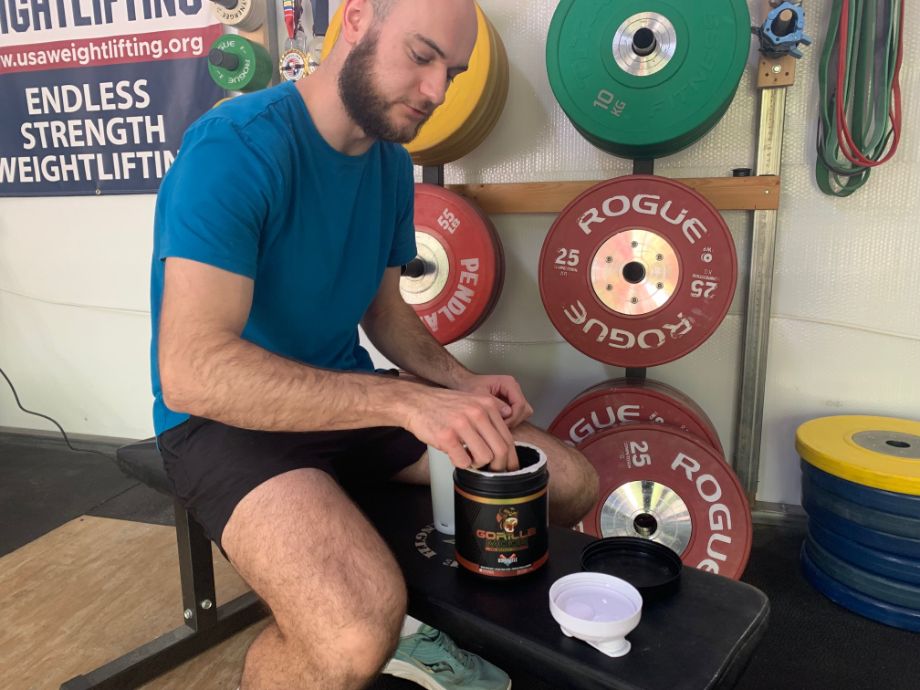
RELATED: Best Pre-Workout for Focus
Pre-workout supplements can support all kinds of training. Whether you’re a bodybuilder hitting the weights or an endurance athlete logging your cardio, pre-workout supplements may help you reach your fitness goals. There are also a few types of pre-workout to choose from, including powder, capsules, and liquid shots.
What Are the Most Common Ingredients in a Pre-Workout?
So, how do pre-workouts work their magic? It’s all in the ingredients—but not all pre-workouts are made the same. Ingredients and doses can vary, so it’s important to read nutrition labels carefully to find the pre-workout that best meets your needs.
Some common pre-workout ingredients include:
Amino Acids
Amino acids are often called the building blocks of our skeletal muscle. While they may not contribute to energy production, they are directly involved in the body’s recovery process and muscle growth. Trial research2 has shown that consuming branched-chain amino acids (BCAAs) before or during exercise can help delay the onset of muscle soreness.
Pre-workouts often contain BCAAs and other amino acids, such as beta-alanine, l-citrulline, and l-arginine.
RELATED: What is the Best Ratio for BCAAs?
Caffeine
Most people turn to pre-workouts for that extra pep in their step before hitting the gym. That’s where caffeine comes into play. Caffeine is a widely used stimulant and a key ingredient in many pre-workouts. Pre-workouts include caffeine to help stimulate the central nervous system (CNS) and help increase energy and focus3.
If you want to try a pre-workout but caffeine or other stimulants are a concern, check out our list of the best stim-free pre-workout supplements.
Creatine
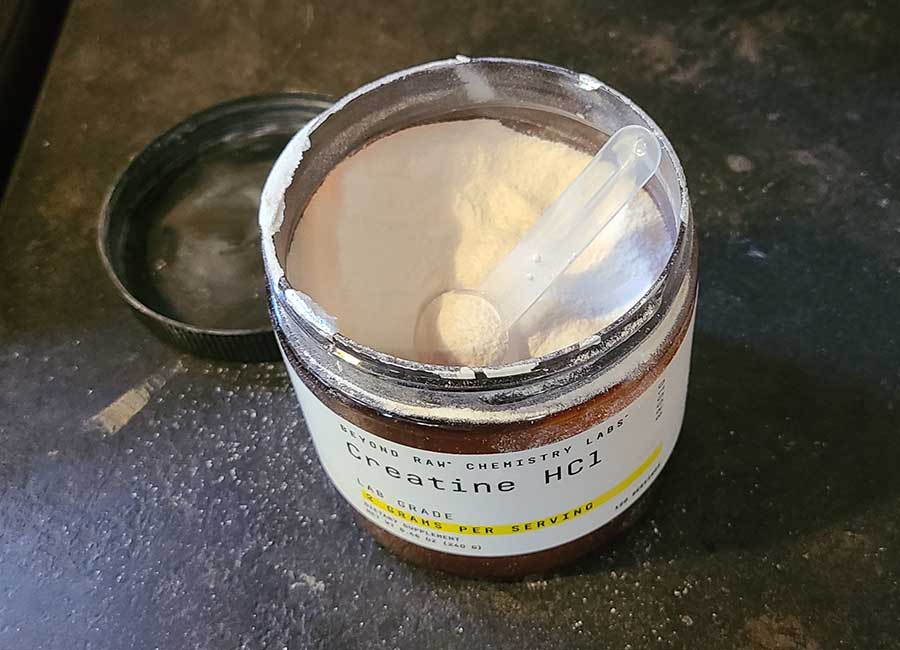
Creatine is found naturally in the body and has been linked in clinical trials4 to improved power, strength, and muscle mass. It’s an amino acid created in the liver, kidneys, and pancreas, and it can also be obtained through your diet. Our muscles store creatine to use for energy, but it can also support total body hydration5 and improve cognitive function6 during times of fatigue—no wonder it’s a popular ingredient in so many pre-workouts.
RELATED: Best Pre-Workout with Creatine
Electrolytes
Electrolytes get a lot of hype post-workout, but they also play a crucial role before and during exercise. We need adequate electrolyte stores to rock our workouts, not to mention operate under standard day-to-day demands. These minerals are essential to many biological processes.
RELATED: Best Electrolyte Drink
We lose a lot of electrolytes through sweat, so making sure you start your workout with enough of this mineral in your system is critical. Enter pre-workout supplements. Most pre-workouts contain a small concentration of electrolytes that help maintain fluid balance, prevent muscle cramps, and support normal muscle and nerve function7. These may include sodium, potassium, chloride, calcium, phosphorus, and magnesium.
Carbohydrates
Glucose is our primary energy source. When we exercise, we use glucose to supply energy or adenosine triphosphate (ATP) to our working muscles. But where do we get the glucose? From carbohydrates, of course! Eating carbs is like putting gas in your car. When we eat a carbohydrate source, our bodies break it down into glucose, which we then use to power ourselves through the day or to rock a workout.
Since consuming carbs before endurance training has been linked to improved performance8, many pre-workout supplements will contain some form of carbohydrate—maltodextrin and dextrose being the most common.
RELATED: Best Pre-Workout Food
So, Does Pre-Workout Have Calories?
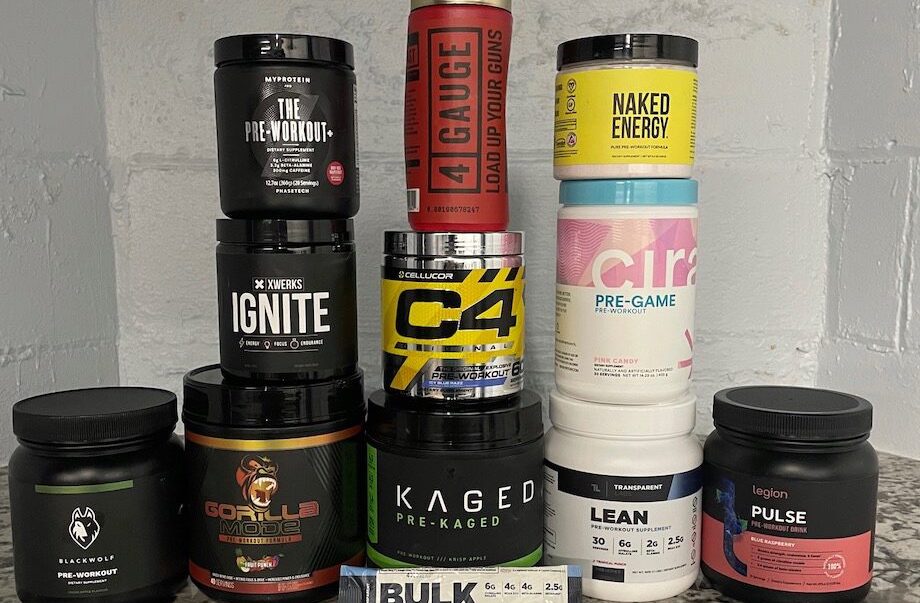
If weight loss is your goal, it’s understandable that you may want to avoid extra calories. Generally speaking, most pre-workout supplements have calories. However, it depends on the ingredients. Supplements containing macronutrients will contribute to your caloric intake for the day. So, those pre-workouts that contain amino acids and a carb source will provide a set number of calories per serving.
RELATED: Best Weight Loss Supplements
If a pre-workout uses artificial sweeteners and doesn’t contain amino acids, it is likely a zero-calorie option. Still, it’s important to remember that artificial sweeteners can cause a spike in insulin9, which can affect your weight or fat loss efforts. Before taking on any unwanted side effects, consider meeting with a registered dietitian nutritionist to find a pre-workout that meets your needs—with calories and fitness goals in mind!
How Many Calories Are In Pre-Workout Supplements?
Determining the calories in pre-workout supplements can be tricky since there are so many different brands, each with its own formula. Most pre-workouts contain a minuscule amount of calories, but it all depends on the ingredients and your serving size.
Even though most pre-workouts only provide a small portion of your daily value, read their nutrition labels carefully. Be sure to check the calories per serving to make an informed decision about incorporating a pre-workout into your fitness routine.
What Determines the Amount of Calories in Pre-Workout?
The macronutrient content determines the calories in each serving of a pre-workout supplement. Pre-workouts won’t contain fats, so carbs and protein are the contributing nutrients.
Let’s get sciencey and talk about the calories in each gram of these macronutrients. When reading those handy nutrition labels, you can check the grams of each nutrient included in one serving of pre-workout. From there, the math is super simple10. On average, one gram of carbohydrate provides four calories, as does one gram of protein. Knowing where the majority of the calories come from can help you choose the proper pre-workout for your needs.
If you use a pre-workout primarily for energy production, you might want most of your calories to come from carbs. But if you rely on pre-workouts for muscle protein synthesis, you may want most of your calories to come from protein.
A registered dietitian nutritionist (like me!) or a certified personal trainer can help you navigate the market and find a supplement that fits your needs.
RELATED: Best Pre-Workout for Muscle Gain

Does Pre-workout Have Calories: Final Thoughts
Most pre-workout supplements have calories, but not many per serving. We can thank the carbohydrates and amino acids for that. Of course, the carbs and protein found in pre-workouts play an important role in enhancing your workout. However, if weight loss is your goal and you’re trying to reduce your daily caloric intake, you can check for zero-calorie pre-workout supplements. Zero-calorie options typically don’t contain amino acids and use artificial sweeteners instead of carbs, so they may affect your workout differently.
If you have questions about pre-workout calories and how they influence your fitness goals, talk with your registered dietitian or certified personal trainer.
- Pre-workout supplements are designed to enhance athletic performance, increase energy levels, and enhance mental focus.
- Pre-workouts may help improve your high-intensity exercise—whether you’re a bodybuilder or a triathlete.
- Common ingredients found in pre-workouts include BCAAs, caffeine, electrolytes, and carbs.
- The calorie content in a pre-workout supplement typically comes from carbohydrate and protein sources.
Does Pre-workout Have Calories: FAQs
Does pre-workout burn calories?
A pre-workout supplement doesn’t burn calories by itself. However, it can help boost your athletic performance, allowing a more significant workload resulting in calorie burn.
How many calories in a scoop of pre-workout?
Roughly speaking, pre-workout supplements can contain anywhere from zero to 200 calories per scoop. It all depends on the brand and the ingredients used. The more carbs and protein involved, the higher the calorie count.
Will pre-workout break my fast?
Pre-workout formulas may interfere with intermittent fasting, but it should be addressed case-by-case. A supplement containing carbohydrates will affect your blood sugar and break your fast. And yet, artificial sweeteners can also cause a spike in your blood glucose and affect your fasting.
Which pre-workout has 0 calories?
Performance Lab SPORT Pre, XWERKS Ignite, Transparent Labs BULK Black, and Bucked Up are a few zero-calorie pre-workout supplements available.
These statements have not been evaluated by the Food and Drug Administration. This product is not intended to diagnose, treat, cure, or prevent any diseases.
References
- Cameron M, Camic CL, Doberstein S, Erickson JL, Jagim AR. The acute effects of a multi-ingredient pre-workout supplement on resting energy expenditure and exercise performance in recreationally active females. J Int Soc Sports Nutr. 2018 Jan 5;15:1. doi: 10.1186/s12970-017-0206-7. PMID: 29311763; PMCID: PMC5755346.
- Ra, S. G., Miyazaki, T., Kojima, R., Komine, S., Ishikura, K., Kawanaka, K., Honda, A., Matsuzaki, Y., & Ohmori, H. (2018). Effect of BCAA supplement timing on exercise-induced muscle soreness and damage: a pilot placebo-controlled double-blind study.The Journal of sports medicine and physical fitness, 58(11), 1582–1591. https://doi.org/10.23736/S0022-4707.17.07638-1
- Martinez N, Campbell B, Franek M, Buchanan L, Colquhoun R. The effect of acute pre-workout supplementation on power and strength performance. J Int Soc Sports Nutr. 2016 Jul 16;13:29. doi: 10.1186/s12970-016-0138-7. PMID: 27429596; PMCID: PMC4947244.
- Wu SH, Chen KL, Hsu C, Chen HC, Chen JY, Yu SY, Shiu YJ. Creatine Supplementation for Muscle Growth: A Scoping Review of Randomized Clinical Trials from 2012 to 2021. Nutrients. 2022 Mar 16;14(6):1255. doi: 10.3390/nu14061255. PMID: 35334912; PMCID: PMC8949037.
- Powers ME, Arnold BL, Weltman AL, Perrin DH, Mistry D, Kahler DM, Kraemer W, Volek J. Creatine Supplementation Increases Total Body Water Without Altering Fluid Distribution. J Athl Train. 2003 Mar;38(1):44-50. PMID: 12937471; PMCID: PMC155510.
- Roschel H, Gualano B, Ostojic SM, Rawson ES. Creatine Supplementation and Brain Health. Nutrients. 2021 Feb 10;13(2):586. doi: 10.3390/nu13020586. PMID: 33578876; PMCID: PMC7916590.
- Shrimanker I, Bhattarai S. Electrolytes. [Updated 2023 Jul 24]. In: StatPearls [Internet]. Treasure Island (FL): StatPearls Publishing; 2023 Jan-. Available from: https://www.ncbi.nlm.nih.gov/books/NBK541123/
- Ormsbee, M. J., Bach, C. W., & Baur, D. A. (2014). Pre-exercise nutrition: the role of macronutrients, modified starches and supplements on metabolism and endurance performance.Nutrients, 6(5), 1782–1808. https://doi.org/10.3390/nu6051782
- Mathur K, Agrawal RK, Nagpure S, Deshpande D. Effect of artificial sweeteners on insulin resistance among type-2 diabetes mellitus patients. J Family Med Prim Care. 2020 Jan 28;9(1):69-71. doi: 10.4103/jfmpc.jfmpc_329_19. PMID: 32110567; PMCID: PMC7014832.
- Food and Nutrition Information Center (FNIC). Food and Nutrition Information Center (FNIC) | National Agricultural Library. (n.d.). https://www.nal.usda.gov/programs/fnic#:~:text=Frequently%20Asked%20Questions%20(FAQs),Facts%20label%20on%20food%20packages.


